Jeff Mills: "I’d advise anyone who makes electronic music to just go into your studio, pick one machine and try to do something with it that you’ve not done before"
Danny Turner chats to the Detroit icon about taking techno to the next level with new project, The Paradox, and collaborating with session jazz pianist Jean-Phi Dary
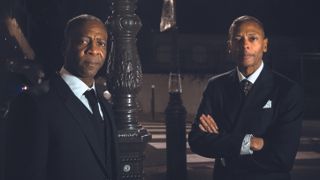
Techno legend Jeff Mills has made it his life’s mission to find new ways to take the genre into unexplored territories while pushing the technological limits of his vintage Roland drum machines. During studio and live sessions for the late Tony Allen’s album, Tomorrow Comes the Harvest, Mills took this ethos one step further in collaboration with session jazz pianist Jean-Phi Dary.
As a result of their various live jams, Mills and Dary formed The Paradox, releasing the album Counter Active in early 2021. However, only upon improvising with Dary live on stage using a combination of synth drums, sequencers and keys did Mills realise he could take his techniques to another level, attaining a common link between free jazz and techno. The result can be found on Paradox: Live at Montreux, recorded at the iconic Montreux Jazz Festival, and UK fans can catch Jeff and Jean-Phi performing Tomorrow Comes the Harvest with tabla player Prabhu Eduoard at Edinburgh International Festival on 11st August .
How did you first come to collaborate with Jean-Phi Dary and discover you had a symbiotic set of skills?
“Drummer Tony Allen and I decided that because things had worked so well in the studio we should perform the album Tomorrow Comes the Harvest, but after a few shows I realised that something was missing. I felt that because Tony was using a full kit alongside me on the drum machine it was a bit too percussive and suggested a third person – a keyboard player, so Tony recommended Jean-Phi Dary who he’d worked with for many years.”
Were the shows with Tony and Jean-Phi all improvised?
“Tony didn’t like to rehearse – we’d just show up a few hours before the show, test everything to make sure all the microphones worked and that was basically it, but I’d also play a little with Jean-Phi beforehand and create things on the fly. That’s when Jean-Phi and I realised that we could possibly create music together just by improvising and decided to go into the studio to put some of these ideas down, which was the beginning of the group The Paradox.”
Both The Paradox and the album title Counter Active imply a contradiction or counteraction of some sort?
Get the MusicRadar Newsletter
Want all the hottest music and gear news, reviews, deals, features and more, direct to your inbox? Sign up here.
“I was having lunch with Jean-Phi and said we need to come up with a title for this project and he told me it was a paradox because us improvising together using keys and a drum machine and somehow making it work was something that most people would not expect to happen.
In electronic music, the solo doesn’t exist. That’s what’s missing from electronic music, because it’s too pre-planned
“Then we had another conversation about our experience of being in the industry and the idea that every once in a while it’s a good idea to reassess where you are musically and creatively and form a counteractive movement by taking advantage of whatever opportunity is there at that time. It’s about being proactive and moving towards what we think music should be; which is in the moment, unrestricted and unconditional.”
How did you approach the initial recordings sessions with Jean-Phi?
“The performances were really just jam sessions. There’s no direction when we play – it’s very much ‘you go first, I’ll follow and then I’ll move to the left, you to the right and we’ll come together again’. There’s no rehearsal, no tempo and no key that we’re playing in and my setup pretty much reflects that; a mix of machines, percussion, cymbals and congas, and sometimes I’m using the tops of the machines for percussion too.
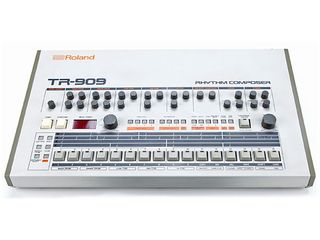
Celebrate 909 day with the greatest Roland TR-909 moments ever
“I found a way to mix all these things together using more than one drum machine until I get to a point where I get the feeling of a live drummer. One drum machine plays the patterns and another with exactly the same tuning is played manually, so I can mix them together, not by MIDI, but creating turnarounds and drum rolls by simply stopping and starting them. Jean-Phi always likes to use a grand piano, which he modifies, some synths and the occasional Rhodes.”
You’re presumably using the Roland drum machines?
“It’s typically two Roland TR-909s and a TR-808, both un-synced, and the synth is typically a TB-303 for acid basslines. For effects, I’m using a prototype that Korg gave me last time I visited them, but my setup changes all the time. On my next live performance I’ll use a different type of 808 and I want to try and sync an 808 and a 909 to see how that changes the scenario, use a few more cymbals and maybe a snare, which I’ve been experimenting with lately.”
You’re getting a lot of juice from these Roland machines – it seems the variations are endless. What does that say for the longevity of these devices?
“For me, the TR-909 is what I really like to work with, but with any of these instruments if you just think about and approach them differently you’ll find a way to generate a different type of sound. At one point I was trying to figure out how to use a live hi-hat differently and thinking about how many ways I could use my drum stick to generate sounds out of that instrument and ended up using those techniques on my new album Mind Power Mind Control.”
You’re always assessing how techno can be re-contextualised. How do you think working with Jean-Phi moves the genre forward within that context?
“Working with Jean-Phi reinforced the view I have that electronic music stays pretty idle and doesn’t move forward in a certain direction because we haven’t discovered a way to improvise with instruments. We typically program everything, press start, everything plays and then we choose what we want to hear before we mix it and there you have the composition. In electronic music, the solo doesn’t exist.
“I realised by playing with Jean-Phi how free you can be when you play how you feel, and that’s what’s missing from electronic music because it’s too pre-planned. Nothing happens in the moment other than muting or unmuting, but if we can find ways to improvise and solo we can have deeper conversations with other genres of music and speak to rock and jazz musicians.”
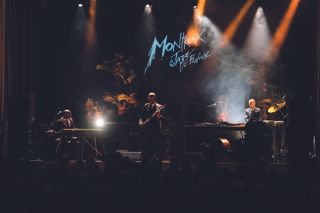
’70s prog rock was probably the last time electronic instruments were played in a truly improvisational setting, but people thought it was a bit self-indulgent…
“Perhaps it was because it was a bit ahead of its time or because rock ’n’ roll had such an impact that anything that came close was not taken as seriously as it should have been. When you think of what was happening in fusion jazz and fusion rock, and how they began to mix with classical, for me that was the way forward and I don’t believe we do that enough in electronic music right now. Collaborating with Jean-Phi made me realise the distance we need to go to be on the same level as other genres.”
You’ve mentioned that creatively we have exhausted ideas to a point. Do you find that we’re just adding to what already exists rather than creating much that’s new?
“A few things are happening. The music industry is making the mistake of rewarding artists and people who recreate other people’s ideas and don’t put enough emphasis on those who truly have a new idea because we don’t feel as comfortable relating it to something that we already know.
“If you look like Elvis Presley, that’s a good thing because you look like someone that was very popular, so we reward that person and would rather recreate something than create something from scratch. Why work hard to create something new when all I have to do is sound like DJ Pierre, Carl Craig or Underground Resistance and get credit for that? That’s where we are and so I don’t feel the sense that we’re moving in the right direction.”
Can you make something entirely new without borrowing from the past – don’t you need a reference point?
“I’m not so sure. For example, I’m discovering how to play the TR-909 differently all the time, and that’s a reminder that we haven’t explored all that we can. For the past six or seven years I’ve been playing the drum machine individually with two hands without a MIDI cable but I’ve yet to be asked by any journalist exactly how I’m making the machine sound like a drummer.
I look to jazz, classical, contemporary dance, science fiction, space and art to give me a reason to keep making music
“It’s not like I haven’t been available and I’ve been performing every week to millions of people over a period of time, so that tells me that there’s a lack of curiosity, but if you try to do this you’re going to discover something that may lead to something else. You may look at a Moog differently or a Korg drum machine differently if you know how you can play it.”
It’s almost as if people don’t seem to see electronic instruments as instruments in the truest sense?
“I guess not. It’s easier to programme a machine, press start, mute and unmute, or maybe people feel that they only want to deal with machines when they’re actually making tracks and don’t want to play it. You sit down and play the guitar because you feel like doing it, not because you want to achieve the goal of making a track.”
Or maybe you’re the Jimi Hendrix of the TR-909 and people don’t have that innate talent?
“I don’t believe that, there are people just as creative or more who have incredible ideas but the industry is not convincing us enough to work harder to come up with something new. In the end, we all suffer from that because we’re not seeing the innovation that we should and artists are not seeing the wonderful mistakes that can happen when people at least try to do that.”
Was it easy to take The Paradox to a live environment, being wholly improvisational?
“We tried to make the atmosphere on-stage as close as we’d made it in the studio. It’s just Jean-Phi and I using eye contact to figure out what we’re going to do, so we decide who starts first and from there we’re off and when we think we’ve played long enough we find a way to end it and move on to the next track. It’s great as there’s nothing to remember or prepare for; you just play how you feel in that moment and react to what we’re hearing.”
Are audiences more responsive to that?
“During a DJ set, when an audience knows I’m about to use a drum machine they get more excited; they know they’re about to hear something that wasn’t planned. That tells me that we need to move more in this direction and find ways for electronic music to be more spontaneous. I wish we could hear more of this in electronic music and see DJs be more impulsive and do unexpected things.
“We don’t have to believe in the idea of making people dance for eight hours straight – it’s OK to turn the music down or give people some space to rethink and rebuild. There’s a lot of territory we haven’t covered and it starts from looking at what we’ve done and what other genres have done to see where we can go.
“If I only look to Detroit and Berlin, I’m never going to learn anything, so I look to jazz, classical, contemporary dance, science fiction, space and art to give me a reason to keep making music and change things up whenever I can.”
It’s not just the two of you in the band; Zaf Zapha plays bass, adding another element to play with…
“There was a frequency space that we felt could be filled with bass that would push the boundaries even wider as Jean-Phi would not always have to play bass and I wouldn’t have to come up with basslines either. We felt that we could both explore more if we had Zaf holding down that frequency.”
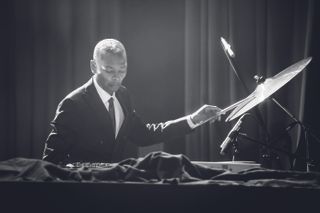
Had you already played a number of shows together prior to your appearance at the Montreux Jazz Festival?
“We’d done quite a few, including three with Zaf. Without much discussion, we knew what we’d have to do for Montreux, which was a very special situation because the concert was in the very middle of the pandemic and we understood the gravity of that. The Montreux Jazz Festival is like a sanctuary, it’s the most concentrated space for free-thinking and music and, as a result, it becomes the place where you can be at your most honest. You’re surrounded by musicians who typically believe what you do about the magic of music and how special that communication is. That means there’s a certain respect for anyone who’s there – listener or musician.”
To what extent did you find working in that environment enhanced your performance?
“As a musician, to be invited to play is quite a lift. I don’t think there’s any festival that’s more prestigious so it was an honour, and having recorded it we have proof that we were there [laughs]. It’s definitely a highlight of my career.”
Alongside Jean-Phi, you allowed each other the freedom to deviate substantially from the original album tracks because the live versions are often twice the length…
“We knew that there was a melody that we should probably move towards at some point, but after making it there we could do whatever we wanted. In tune with the atmosphere, I might also decide that I want the sound to be softer, so we’ll end up creating something completely different because that’s how we’re feeling at that moment.”
During moments of improvisation are there times where you feel a performance is escaping your grasp?
“It’s frightening, yes, and that’s always the case. You also have this feeling of ‘I could have, I should have and I wish I did’. That’s something you have to live with and I don’t think I’ve ever told anyone this, but when I’m playing the drum machine I’m always discovering new things but they go by so quickly that the audience never really detects it.
When I’m playing the drum machine I’m always discovering new things but they go by so quickly that the audience never really detects it
“I’m doing things for the first time all of the time because I’m trying to make a certain combination of sounds from turning knobs and pressing buttons. I don’t think anyone’s interested to know that detail, but when I play the machine again I remember that and that means I’m increasingly progressing my understanding of it the more that I play it. That’s interesting to me as it’s all in the moment, but it is happening and that tells me there’s a lot more we can do with rhythm.”
No matter how long you practise, the amount of time you actually improvise live with other musicians is relatively brief. Are those therefore the moments you learn the most?
“Right, because you’re playing but you’re also listening to the other musicians. You’re counting, keeping time and trying to figure out where to go and what to do next but, because you’re playing with a machine, that transition needs to be very smooth. While you’re doing this, your mind is on overload and you have to communicate with your hands and fingers to be quick, precise and on time. At the end of the night I’m exhausted because my concentration is so strong. It goes by really quickly, but although I’m playing the machine I can’t hear all that I’m doing as it’s happening so fast.”
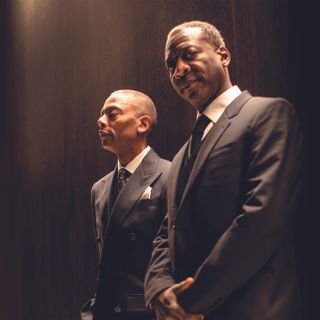
Give us an idea of the micro-decisions you’re making…
“When I’ve got a few thousand people in front of me who are all hanging on the tip of my finger when I’m about to shift that pad, and when you hit it and the place explodes, what’s racing through my mind is figuring out where I go from there within seconds, whether it’s bringing the toms in, opening up the hi-hat, exchanging the snare for the clap, changing the tempo or giving the audience something to think about in terms of silence or layering another track on top of it. That’s frightening, but wonderful, actually.”
With Paradox: Live at Montreux, we’re assuming you learnt a lot from studying that recording retrospectively?
“When I listen back, I realise that I tend to do certain things not because the machine is making me do them but because I do it naturally. I tend to focus on an accent on the one or the three because that’s how I’m feeling at that moment and it becomes part of my character I suppose. Then I find myself trying to replicate that when I’m programming the machine because I did it live and want to recreate it.
Where I really excel is using the drum machine and now I think of myself as a percussionist more than anything else
“I’d advise anyone who makes electronic music to just go into your studio, pick one machine and try to do something with it that you’ve not done before. Try to make it do something different. No one has to know what you did, but see where that leads.”
Do you need an understanding of what’s under the hood?
“Yes. For example, I know exactly how long the ride cymbal sustain lasts for on the 909 so I can connect sounds together and make it sound almost seamless. If you hit the snare with a drum stick in a certain way, you know how long the resonance will be; with a drum machine you’re not supposed to have that understanding, but if you fool around with it long enough you’ll find a way to make that happen. So I know the limitations of the crash, the ride, the clap, the snare, the kick drum and all the tunings, and it’s important to fool around with a machine to understand it as an instrument.”
You’ve given them a beating over the years…
“The machines are old and the internal parts are from the ’70s are ’80s so no two machines sound the same, which makes them even closer to acoustic instruments. When you master a machine you start to become a virtuoso, which is an interesting way to look at it. I didn’t think that I’d be considered a percussionist until I really started to focus on the 909. Before that I was just a producer/DJ who did basslines, strings and drums, but where I really excel is using the drum machine and now I think of myself as a percussionist more than anything else.”
Do you plan to work and record with Jean-Phi again in the near future?
“The dates are accumulating; we have more live performances this year and the next. As for my label, Axis Records, we’re preparing to release some jazz and rock fusion artists and I’m currently producing the soundtrack for Fritz Lang’s Dr. Mabuse for an event this summer.”
We noticed that you also produced a magazine called Escape Velocity. Is that still running?
“We flirted with journalism and media during the pandemic because we signed about 60 artists during that period and so many were making great albums that we thought we needed more publicity than we could achieve by talking to other magazines. We sat down and rethought what a magazine could be, for example, what a front cover should be – does it always have to be an image, could it be video, could it be sound, could it be nothing? But it took up too much of our time, so we stopped after three magazines and left it at that. Maybe we can pick it back up again one day.”
Do you think there is a demand for physical, non-digital objects again?
“Maybe there needs to be a generation that walks around with absolutely nothing and are perfectly fine with that and then we can start all over again, but every generation thinks their generation is best.”
The ’80s were the best though…
“That’s without question, right [laughs]?”


Future Music is the number one magazine for today's producers. Packed with technique and technology we'll help you make great new music. All-access artist interviews, in-depth gear reviews, essential production tutorials and much more. Every marvellous monthly edition features reliable reviews of the latest and greatest hardware and software technology and techniques, unparalleled advice, in-depth interviews, sensational free samples and so much more to improve the experience and outcome of your music-making.
Most Popular







